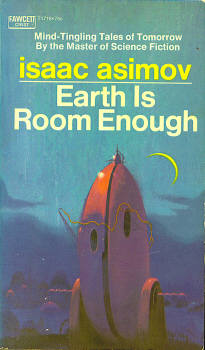
Earth is Room Enough
Isaac Asimov
208 pages
published in 1957
As the backcover blurb has it, “ANYTHING CAN HAPPEN and probably will RIGHT HERE ON EARTH” — which is why Earth is Room Enough for Asimov to set his stories on. This, with another Asimov collection, Buy Jupiter, is one of the books that made me into a science fiction reader and fan. It’s not so much that this is an outstanding collection — a good few of the stories here are amusing at best — but that Asimov is at any rate such an easy and pleasant writer to meet when you’re young. A clever ten year old can follow his stories but since they were originally written for adults, there’s no talking down here. Asimov might not be the best writer now to introduce you to science fiction, but he was for me.
Earth is Room Enough, originally published in 1957 and which stayed in print for at least twenty years is is a collection of stories written between 1951 and 1957 and somewhat of a grab bag, jokes and shaggy dog stories intermixed with more serious ones. As said, all stories were set on Earth and deliberately picked by Asimove for the collection, to prove he could do more than write galactic space opera. Mind, he cheats a bit by including two pieces of comic verse… It doesn’t make for a first rate collection, but it certainly wasn’t a chore reading this either.
-
The Dead Past (1956)
The longest, most serious and best story in the collection. What happens when a professor of ancient history, who also looks like a professor of ancient history, does not let the rejection of his application to use the world’s only chronoscope stop him from attempting to view the past to prove the innocence of Carthaginians to the charge of sacrifising infant children by burning them alive. But the past is a relative term and the world government does have a good reason for limiting the use of the chronoscope. This is interesting also for its view of science managed as strictly as any factory, as fordist a view of the future you’ll ever find in science fiction. -
The Foundation of S. F. Success (1954)
“Take an Empire that was Roman and you’ll find it is at home in all the starry Milky Way”… A clever but silly poem about how to get ahead in science fiction, with apologies to W. S. Gilbert. Notice the pun in the title; it’s a recurring theme. -
Franchise (1955)
One of Asimov’s Multivac’s stories. In the year 2008 voting in the United State is obsolete, Multivac being able to predict correctly who would win an election based solely on questioning a single voter. Complete bollocks of course, but interesting again for its view of a benign (computerised) bureaucracy submitting documents in triplicate forever. -
Gimmicks Three (1956)
A compently done story of a man sellign his soul to the devil, then tricking his way to freedom when the devil comes to claim it. -
Kid Stuff (1953)
A fantasy writer sees an elf but luckily his son doesn’t believe in kid stuff like elves. -
The Watery Place (1956)
Aliens land at a hick town eager to make first contact. Redneck sheriff fucks it up for humanity. The payoff is in the last sentence and is groan worthy. -
Living Space (1956)
In a future where every person can have their own private parallel Earth, what are the odds somebody else is already inhabiting your earth? -
The Message (1956)
A far future historian travels back in time to World War Ii and wants to leave a message. The end result is a familiar piece of graffiti. -
Satisfaction Guaranteed (1951)
A Susan Calvin robot story. A dissatisfied housewife is helped by the robot prototype her husband brings back from work to regain her self esteem. Very very fifties in its assumptions. -
Hell-Fire (1956)
Is that he face of Satan seen in that superfast film of an atomic bomb explosion? Yes. -
The Last Trump (1955)
It’s the end of the world and now one junior angel has to look for a loophole to undo the Last Trump. -
The Fun They Had (1951)
Even school can sound like fun when you’re not used to it. One of those Asimov stories almost entirely told through infodumps. -
Jokester (1956)
One of the genius rated researchers with unlimited access to Multivac asks the question where jokes come from. The answer is surprising. This story freaked me out when I first read it. -
The Immortal Bard (1954)
If Shakespeare could travel forward in time to follow a college course on his own works, would he do well? No. -
Someday (1956)
Another Multivac story about two boys who find and abuse an old Bard storytelling robot, who when they leave it alone, starts telling a story that computers would grow more and more powerful until someday … someday … someday …. -
An Author’s Ordeal (1957)
Another piece of comic verse doggerel, about the problems the author has in thinking up these outrageous things. -
Dreaming Is a Private Thing (1955)
An old fashioned craftsman poo-poohs the idea that mass produced examples of his craft will supersede him. He’s a dreamer, literally.
Nostalgia played a large part in why I reread and liked this collection, but what I also liked this time around was seeing how much of the era in which Asimov wrote these stories soaked unconsciously in them. These are very 1950ties futures Asimov shows us, full of white fenced houses with mother at home making dinner and dad putting in a hard shift at the robot design bureau before putting on the jetpack to go home. Very Jetsons.